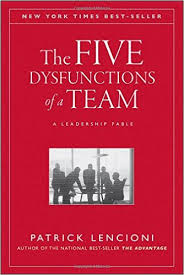By Kelley Reynolds
Jim Collins is one of the authors who brought us Built to Last: Successful Habits of Visionary Companies and From Good to Great: Why Some Companies Make the Leap and Others Don’t. A few years ago, Collins was facilitating a session for military generals, CEOs and other leaders. During one of the breaks, one of the participants asked Collins, “When you are on the top of the world, the most successful company in your industry, your power and success might coverup the fact that you are already on the path to decline. How would you know?” This conversation inspired Collins to conduct research which lead to this book.
Collins previous books were focused on companies building on greatness. Collins was now curious to understand the decline of once great companies. This book is the embodiment of the philosophy of “We learn more from our failures than we do by our successes.”
Each chapter is easy to read. There are interesting examples provided to illustrate the findings of his research. Most every company used as an example was well known, for example A&P, Rubbermaid and Scott Paper. Collins also shared experiences and lessons learned from his life. Although the research started with one question, the answer lead to more questions. The chapters flow logically from each new question. For those who are interested in greater details, there are several appendices which provide additional information for the companies referenced in the book.
From Collins previous works, Good to Great and Built to Last, he and his research team had already amassed records which reflected a combined 6000 years of corporate history. They selected 60 major companies. Within the 60, they identified 11 companies that met their rigorous criteria which included a rise and fall.
Armed with the new information, the team updated their previous research. The questions they sought answers to were: What happened leading up to the point at which decline became visible and what did the company do once it began to fall? They utilized historical materials. Materials that were produced from the time of the companies’ founding to its decline, focusing on specific eras. These materials included such items as annual reports, major articles published about the company and industry reference materials. Collins did not want to rely upon retrospective interviews as those could be clouded or biased. The documents used were published and written at the those points in time without the knowledge of what would occur to the businesses.
As they researched, the team selected as a control set, a successful company that was a contemporary of the business that had fallen. The companies selected had risen at the same time and were in the same industry, such as Circuit City and Best Buy; Ames and Wal-Mart.
Collins considered the following questions: Are there clearly distinguishable stages of decline? If so, can you spot decline early? Are there telltale markers? Can you reverse decline? If so, how? Is there a point of no return?
Based upon the research, Collins and his team identified five stages of decline:
Stage 1: Hubris Born of Success
Collins cited many examples of hubris including undisciplined endeavors into areas where a company cannot excel; ignoring evidence to make risky decisions and outright denial that their company is at risk. One form of hubris Collins referred to was Arrogant Neglect. He provided the example of Circuit City that diverted its attention from their primary “flywheel,” what made the company successful, to chase the next big thing, on the assumption that their original success will take care of itself. As in relationships, if you divert your attention or ignore someone long enough, the relationship will decline.
Stage 2: Undisciplined Pursuit of More
During the research portion, Collins expected to find that companies had rested upon their laurels and had become complacent. However, in most of the companies reviewed, this was not the case. The opposite was found; the companies were found to have overreached. The companies were obsessed with growth. They strayed from their core purposes and values. When attempting to grow quickly, the companies were unable to fill vacant seats with the right people. The #1 ingredient for a culture of discipline is having the right people. The people who are self- managed and exemplify self-motivation do not require lots of rules and bureaucracy. When a company instituted many needless rules and bureaucracy, the company drove away the right people. The businesses suffered from vacancies born of rapid growth and loss of their key people.
Stage 3: Denial of Risk
This stage was marked with discounting negative or unpleasant information rather than addressing what was wrong with the company. The leaders made decisions that were not based upon the facts of the situation. The leaders shifted to dictatorial management, or, the members stopped telling the leaders what the leaders were unwilling to hear.
Stage 4: Grasping for Salvation
Panic is not pretty. The companies changed leaders. They moved headquarters. They searched for silver bullets. They restructured, again and again. This lead to confusion and disappointment. Collins described this reactive behavior as counter intuitive. It was contrary to survival. When the companies behaved in a frantic manner it accelerated their demise. Collins shared lessons learned from a combat veteran. Remain calm. Focus and take one shot at a time.
Stage 5: Capitulation to Irrelevance or Death
Collins research revealed two versions of stage 5. CEOs either decided to stop fighting for the company; or they continued to fight until there were out of options. Once those in power gave up hope, there was nothing left for them to give.
Well Founded Hope
The final chapter of the book Collins sought to prepare and empower leaders. He wanted to give hope.
Collins believed that decline was largely self-inflicted and recovery was often within the leader’s control. Companies experienced peaks and valleys. Just because a company experienced a decline did not mean it would fail. Being great did not preclude a company from falling. At the same time, just because a company fell, did not preclude it from raising again.
With empowerment, you have choices in how to respond to your situations. With adversity comes opportunity for growth and greatness. Collins wrote: “The signature of the truly great versus the merely successful is not the absence of difficulty, but the ability to come back from setbacks, even cataclysmic catastrophes, stronger than before.”
He ended the book with this: “Success is falling down and getting up one more time, without end.”














